| DELOS
-- THE DELEAN LEAGUE
- The years following the Persian wars were dominated
by the growth of Athenian power. The foundation had been laid by Themistocles
who early on perceived the importance of a strong navy. The withdrawal
of the Spartans from the continuing war against the Persians further
played into the hands of the Athenians who now assumed the role of
protagonist of Hellenic freedom.
- To establish closer ties with the Ionians
and the islands the Athenians established the League on the island
of Delos, the ancient centre of Ioanian worship, in 478-77 B.C. and
it was henceforth called the Confederacy of Delos. The object of the
Delian League was to protect the outlying rescued areas from renewed
Persian attacks. But although it was formed as a maritime organization
with an anti-Persian orientation, the alliance very soon became an
instrument for realizing Athenian ambitions in «Hellas» proper. Still,
dealing with the intiatial purposes for the formation of the League
they also wished as Zimmern tells us:
«to push the war into the enemy's
country, to revenge and indemnify themselves by plundering for the losses
they had sustained and to complete the liberation of their enslaved brothers.
They were ready and eager to be led to the attack. (Zimmern, 1947, p. 186).»
- The alliance then represented a duality in character,
since it was established not only for freedom but also for defence.
Furthermore, apart from the primary objectives other factors, probably
of a more practical nature, contributed to the creation of the Delian
League.
According to Plutarch, it was under pressure particularly from Chians,
Samians and Lesbians that Aristides on behalf of the Athenians took
over the leadership of the allies (Meiggs, 1979, p. 42).
Fear could be a possible excuse for the pressure
of the allies to institutionalize the Delian League. Fear and the
threat of a probable reconquest by the «Barbarians» who still,
not only had not lost their military power but also had not abandoned
totally their «imperialistic» plans towards the West. The Greek, free,
adventurous spirit was afraid of becoming subjugated to Persian rule.
Their love of freedom made them realize from the very beginning that
without a common League they would very soon become a part of a Persian
Satrapy. But fear, according to Meiggs, could have motivated the Athenians
to accept the responsibilities not only of establishing the League
but also of becoming the leader of the alliance. The Athenians had
very soon understood *that they would be the ultimate target of the
Persians in the event of a new attack. One could say that since Themistocles
had made Athens a sea-power the Persians would be challenged by the
superiority of the Athenians at sea. The Athenians, however, in order
to protect their city fortified Athens in 478 B.C., and in order to
protect their sea power estabished the Delian
League.
For some historians it was also pride
and generosity after the glorious victories over the Persians that
led the Athenians to institutionalize the unification of the Ionian
world. (Meiggs 1979:43, Fleiss 1966: 5)].
Meiggs in "The Athenian Empire" adds another factor that played a
decisive role in the establishment of the League. This is the role
of the «Individuals». It is very probable, as Plutarch tells us, that
these people didn't work for their own personal success. There is
no clear indication that they were motivated by their own interest;
instead, they acted according to the needs of Athens.
The glory of their state was placed above all else. Aristides was
probably one of those Athenians who was motivated by «patriotism».
Aristides was the personality of the time, the man who had organized
the Delian League.
However, Aristides' real motives became debatable concerning as did
the pretexts that he used for the establishment of the alliance. For
some, he was a shrewd man who had perceived the idea of uniting the
Athenians and the Ionians in order to benefit the Athenians economically,
and politically.
For others, such as his contemporary Athenian Callaeschrus, he was
nothing but a cunning person. "A fox by name and fox by nature".
C Meiggs 1979:40).
One could say that these characterizations are
probably cynical since Aristides is well known in Greek historical
tradition as (a) (Meiggs 1979:44) a man of justice
who was generous to friends and enemies. Furthermore, Aristides was
an Athenian who «loved» his state and as a consequence he would do
the best for Athens. Taking also into account, that the rise of Athens
had been perhaps delayed not only because of internal political strife
but also because of the lack of resources, Aristides clearly expressed
the Athenian motives. I would dare say then that Athenenian policies
were not motivated by altruism or dreams of heroic grandeur alone,
but also by considerations of a pragmatic nature. At this point, I
would like to refer to an additional reason that could probably justify
the «foreign policy» of Athens concerning the confederacy of Delos.
It was perhaps «ARCHE» political domination
over the others that motivated the Athenians. Could it be true that
the Athenians needed an overglorified position of ruling, an «ARCHE»
over all in order to justify their own freedom? It is possible, then,
that the Delian League was the means to express their political domination
and their role of protector.
Concluding the reasons that led to the establishment of the League,
it would be valuable to stress the attitude of Sparta towards the
fears of the majority of the Greek world and their need for such an
alliance.
1. ARCHE: Harmony, Power Politics, Athenian domination
According to Barry, it was Sparta's inability
and unwillingness, exhibited in her failure to follow up the battle
of Mycale (479 B.C.) that forced upon Athens the leadership
of a large segment of the Greek world (Burry 1963:328).
Perhaps it was the naval supremacy of Athens
that deterred the Spartans from joining the alliance or the fact that
Sparta's political system and military orientation did not allow for
a «flexible» foreign policy.
As a consequence, Sparta remained outside the Delian alliance, but
Athenian supremacy over the League of the Ionians did challenge Sparta
to take up the search for her own «spheres» of influence.
By the spring of 478 or 477 the Confederacy of
Delos was ready. Aristides the «assessor» first drew up a list of
members who numbered about 140 and were entitled to be ranked as a
charter-members.
- The Delian League included the Ionian and Aelian cities of Asia;
the islands adjacent to coast from Lesbos to Rhodes; 35 cities from the Hellespont;
35 from Thrace, most of the Cyclades; Euboea except the city of Carystus;
and 24 from the region of Caria. (Mc gregor 1987:101).
The allies had to confirm their loyalty to the
League by a common oath. The members swore to have the same friends
and enemies: «I will not desert the plethos, (common people) of Athens
nor the allies of the Athenians» (Meiggs 1979:45).
- The permanence of the alliance was symbolized
by the dropping of iron weights into the sea: «The
alliance was to last until the weights rose up again».
Delos was chosen to be the centre of the League because of its religious
associations and its practical advantages. The Delian temple of Apollo
formed a convenient bank and the first contributions were paid there. Delos
was situated in the centre of the Aegean (1), it had a good harbour and like
Delphi it had always been too wealthy to have independent political ambitions (2).
(Meiggs 1979:43).
- According to Thucydides,
the Athenians had determined a fixed amount of 460 talents which all the
cities were obliged to pay. Meiggs
accepts the source of Thucydides upon the fixed contribution
as more reliable while Plutarch is characterized by
him as a late and probably unreliable source. (Meiggs 1979:58).
Thus from the very beginning the Confederacy consisted
of two kinds of members: those who paid an equivalent in money, a "phoros" as
it was called, and those who furnished ships. (The first class was larger).
One could say, though, that this differentiation created a problem since
the majority of the allies, even those who were able to contribute ships,
preferred the system of money payments, which did not oblige their men
to leave home.
- The tribute was received by ten Athenian officers who bore the title of
Hellenotamiae or Treasurers of the Greeks (Fine 1983:363).
The economic character of the Delean League followed this type of arrangment
till 525 BC when Aristidis was replaced as the financier of the Alliance
by Cleon.
Furthermore, the council of the confederates met at Delos, where the
treasury was located, and each member had an equal vote, in order that the stronger
members would have no formal advantage in the council. (Fine
1983:364). According to Thucydides the allies were at first autonomous
but at the same time were not in a suspicious mood. This reaction of the
allies could probably explain the acceptance of Athenian "hegemony"
from the early period of the formation of the League. Athens, hence, could
influence the smaller states and the number of these votes overcame the
weight of any opposition which the larger states could offer.
- As leader of the Confederacy, Athens had the
executive entirely in her hands and it was of the greatest significance
that the treasurers were not selected by the whole body of Confederates
but by the Athenian citizens. The Delian League then having settled the
political and economic structure started taking actions under the leadership
of Athens. In 476, Eion was captured from the Persians by Cimon.
From that time on Cimon initiated a number of expeditions in the Aegean.
Scyros, Carystus and Naxos which had been notorious pirate bases now became
Athenian settlements (Cleruchies). Simon also as leader of the Delian
Alliance sailed to the Eurymedon in Asia Minor in 467 where he won decisive
victories at sea and on land. The Eurymedon marked the culmination of Athenian
leadership against Persia, it eliminated any serious threat to the Aegean
and opened the way for a profitable offensive in the Eastern Mediterranean.
- The actions of the League were escalated
by the Athenian expedition to Egypt in 459 B.C. with 200 or 300 ships.
Unfortunately, this expediton proved to be disastrous for the alliance
in terms of lost soldiers and ships (Burn 1962: 127).
With the passing of time many expeditions were undertaken by the Delian
League. Some were quite successful in terms of political and economic
gains while others proved to be disastrous. However, the Alliance
seemed to be bothered by a probably crucial difficulty. Since the
primary purpose of the League was, as Thucydides tells us, to ravage
the King's territory in vengeance for the damage he had inflicted
(Meiggs 1979:44); how could the defensive character of the alliance
be justified?
According to Fleiss, the determined pursuit of
the Persians had two effects: on the one hand it raised Athenian prestige
throughout the Ionian world and brought more cities into the alliance,
while, on the other hand, it encouraged defections from the League.
(Fleiss 1966:5). The Delian Alliance then becomes
transformed from a defensive military organisation, as for example,
the Hellenic League was (481 BC), to a commercial Alliance.
Athens stood not only for freedom from the Barbarians
(the Persians) but also for freedom of intercourse and freedom of
trade.
Athens, despite the fact that it established what Thycydides called
"A hegemony over autonomous allies who participated in common
synods" (Kagan 1969:40) had probably based her
"hegemony", her power politics, upon mutual dependence.
This is a quite possible since both were interdependent for reasons
of survival. Athens needed the resources of the allies and the allies
were dependent upon the Athenians because they provided them with
a secure life. Athens as a sea power would "police" the
Aegean with her triremes and, taking advantage of the allies, played
the role of the protector and consequently "imposed" her
"power politics", her political and judicial dominion.
Although some of the allies, such as Naxos, Melos and Mytelene, protested
against this association, viewing their obligations of membership
as excessively burdensome, the administration of justice was preferable.
Taking into consideration these advantages the allies continued to
participate in the League despite their occasional conflicts with
Athens.
In the years following 460 BC the Athenians were extremely active.
Most events that took place during that era show that the Athenians
abandoned the policy advocated by Gimon and began hostilities with
various allies of Sparta and soon with Sparta itself.
In fact, the fighting in Greece from 459 until 445 (the date of the
Thirty Years' Peace between Athens and Sparta), with an intervening
five years' truce, can be called the First Peloponnesian War to contrast
it with the Great Peloponnesian War which broke out in 431. Thucydides
implies that Athens began hostilities by naval attacks on allies of
Sparta such as Corinth and Aegina which by the spring of 457 was forced
to surrender and come into the «Athenian» League as a
tribute-paying member. What is noteworthy about these struggles is
that it was the first recorded time that Athenian allies --presumably
members of the Delian League-- took up arms against a Greek in a quarrel
which existed solely between that State and Athens.
However, the conflicts were multiplied since the Corinthians and their
allies, wishing to aid Aegina, invaded Megara in the belief that the
Athenians, with large forces occupied in Aegina and Egypt, would have
to raise the siege of Aegina in order to bring support to their recent
ally, Megara.
The above events could convince us that the promising character of
the Delian «Confederacy» had been changed. The common
oath had been replaced by struggles revolts and civil wars under Athenian
hegemony.
. In 454 BC the treasury
of the League was transferred from Delos to Athens
(1).
- According to Davies the catastrophe of the Egyptian expedition
in 454 BC, and the revolts of the allies motivated the Athenians to
transfer the treasury to Athens.
- Whether fear was the true reason or merely
a pretext we are not able to know. It seems very probable, though,
that the Athenians in a very short timemanaged to turn the event to
their own advantage.
- From that year (454) they began to collect
one sixteenth of the tribute paid by the allies as the first obligation
to Athena Polias, Patron of Athens and now Patron of the reorganized
League.
- A careful record was made each year of the
aparche paid to Athena, the amount was audited by the Iogistae for
the Helenotamial and the annual lists were inscribed on a large stone
pillar displayed on the Acropolis. After the removal of the treasury
from Delos to Athens the character of the Delian League changeds without
pretext. Inititated as a defensive alliance, it turned into a merely
maritime Confederacy and changed the Athenian «Empire».
The money collected would soon provide temples on the Acropolis, support
the Athenian fleet, provide work for the citizens of Athens and accumulate
a reserve fund. In 453 Pericles initiated an expedition to the Corinthian
Gulf. In the same year the area of Achaea was brought under Athenian
power and in 450, Cimon sailed to Cyprus where he won a crushing victory.
- By 450, the Delian League appeared to have
been trasnsformed from a collection of autonomous Aegean States, united
in a defensive purpose, under the hegemony of Athens with its central
treasury at Delos into an organization of Athenian colonies, still
nominally autonomous, but whose centre and treasury was now in Athens.
- It appears that Athens had just become conscious
of her «new» power and as a consequence, unfolded a vitality
that would not let her remain inactive in the face of the opportunities
presented. But whatever the tendencies of Athens were, which are probably
attributable to emotional and pragmatic causes, it is clear that the
allies were considered to be of crucial impotance. What justified
the tolerance of the allies towards Athenian «power politics»
and the pressure on behalf of the Athenians for controlling the Aegean
and the Ionians is perhaps their interdependence for survival. The
allies needed Athenian protection and Athens needed their resources
and their ports.
- However noting the emotional reasons, perhaps
the most striking expression of the compulsive basis of Athenian «hegemonic»
policy is the statement of the Athenian envoy Euphemus at Camarina
in Sicily, during the great Sicilian campaign: «We are rulers
in order not to be subjects «(Fleiss 1966: 108).
- Concluding I would say that, the Delian
League -- which was established and developed during the years between
the Persian Wars and the Peloponnesian War could be characterized
as a promising alliance with a defensive character that was steadily
«converted» into a collection of allies under the «ARCHE»
of Athens. It seems that all powers benefitted from this alliance
since all powers were probably seeking ways to justify their tendencies.
(1) Although several sources (for example Plutarch,
Perikles, Aristides) refer to this significant event, it is according
to Fine, epigraphic evidence which provides the date. A series of very
important inscriptions known as the tribute-quota lists, many fragments
of which have been found especially on the Athenian Acropolis, furnish
valuable information on various aspects, particularly the financial,
of the Delian League. (back)
Click here for works
cited
by Lina Kapernarou
Photos © Ian Swindale
Copyright: Hellenic Electronic Center
Back to Cyclades Islands
|
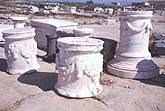
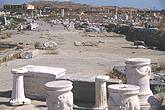
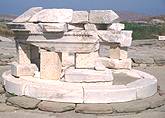
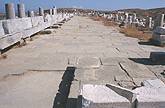
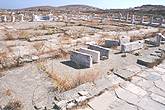
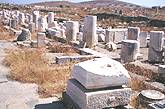
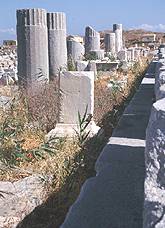
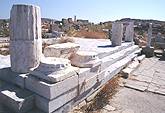

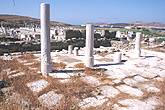
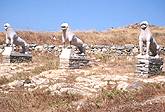
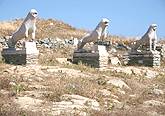
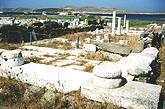
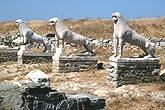
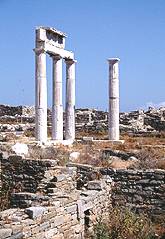
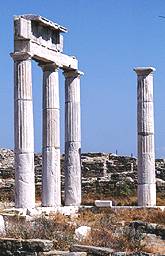
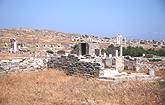
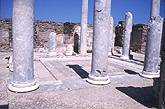
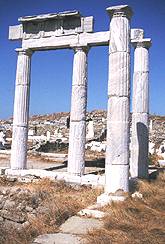
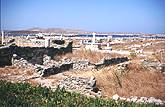
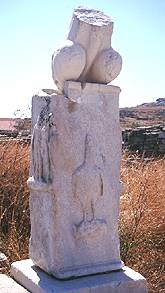
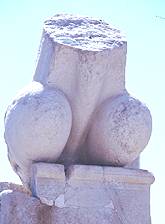
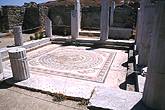
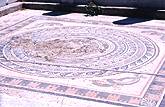
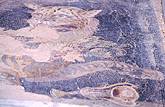
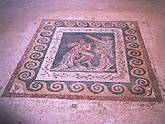

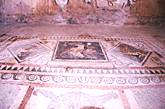
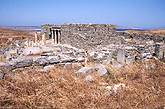
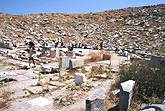
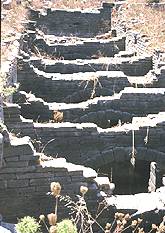
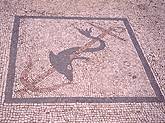
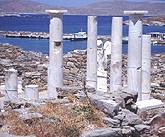


|


































